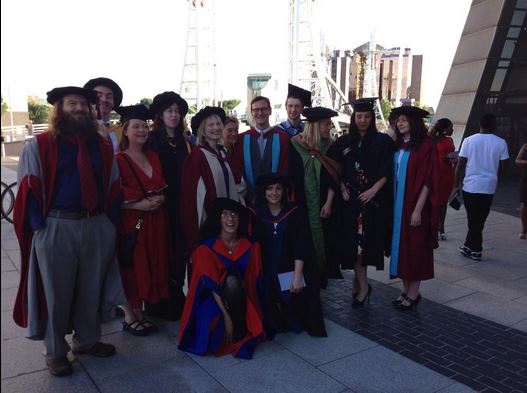 Graduation is a very special time of year, when all the hard work finally pays off. As a student you get to breathe a sigh of relief, safe in the knowledge that you have completed your degree and never have to look at SPSS again (unless you want to of course!). Walking across the stage to collect your certificate is a defining moment and really does mark the point where your degree journey ends and a new chapter begins, and you can look to the future knowing that you have already achieved so much. As a family member or friend you get the chance to share in the celebrations of your loved one, and you get a sense of just how much effort they have put into their studies and how much it means to have completed a degree. And as a lecturer you get to see how far each student has progressed– from that first tentative meeting in a research methods seminar when the simple mention of the word “median” led to panicked looks, to a group of confident individuals who are relishing the next challenge.
Graduation is a very special time of year, when all the hard work finally pays off. As a student you get to breathe a sigh of relief, safe in the knowledge that you have completed your degree and never have to look at SPSS again (unless you want to of course!). Walking across the stage to collect your certificate is a defining moment and really does mark the point where your degree journey ends and a new chapter begins, and you can look to the future knowing that you have already achieved so much. As a family member or friend you get the chance to share in the celebrations of your loved one, and you get a sense of just how much effort they have put into their studies and how much it means to have completed a degree. And as a lecturer you get to see how far each student has progressed– from that first tentative meeting in a research methods seminar when the simple mention of the word “median” led to panicked looks, to a group of confident individuals who are relishing the next challenge.
 This year we had so much to celebrate – including the fact that the sun came out for graduation (although it sure is hot in a cap and gown!). The students graduating in July 2014 were the largest cohort to have studied Psychology, Psychology and Criminology, and Psychology and Counselling at the University of Salford. This year we delivered our widest ever offering of final year modules (logistically challenging but academically rewarding!). We also witnessed some outstanding achievements from our students, both in terms of assessed work (the quality and creativity of student work was commended by our external examiners) and the success of many students in extra-curricular activities (for example taking part in volunteering work, and completing the Salford Advantage Award). All students who have graduated this year have achieved a great deal, and a special mention must go to our prize winners:
This year we had so much to celebrate – including the fact that the sun came out for graduation (although it sure is hot in a cap and gown!). The students graduating in July 2014 were the largest cohort to have studied Psychology, Psychology and Criminology, and Psychology and Counselling at the University of Salford. This year we delivered our widest ever offering of final year modules (logistically challenging but academically rewarding!). We also witnessed some outstanding achievements from our students, both in terms of assessed work (the quality and creativity of student work was commended by our external examiners) and the success of many students in extra-curricular activities (for example taking part in volunteering work, and completing the Salford Advantage Award). All students who have graduated this year have achieved a great deal, and a special mention must go to our prize winners:
- British Psychological Society prize for Best Student – Rachel Gribbin (Psychology and Criminology)
- Best Non-Commissioned Student in the School of Health Sciences – Rachel Gribbin (Psychology and Criminology)
- Best Psychology Student – Carmen-Florentina Ionita
- Best Psychology and Counselling Student – Zander Claassen
- The Endeavour Award – Nikki-Ann Cohen (Psychology)
BSc (Hons) Psychology graduate Danielle Butler has also been shortlisted for the Jonathan Sime Award, an award for dissertation research focused on people-environment issues. Good luck Danielle!
On behalf of the Psychology team I would like to wish all our Graduates every success for the future. Your achievements are well deserved and you are a credit to the University of Salford.
Catherine Thompson
Programme Leader for Psychology and Criminology


